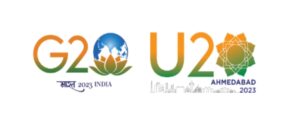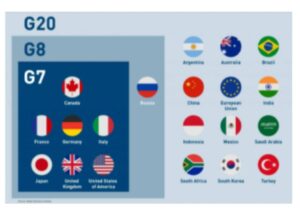The U20 Promise.
Relevance:
- GS Paper 2 Bilateral, regional and global groupings and agreements involving India and/or affecting India’s interests.
- Tags: #G20 #U20 #India #upsc
Why in the News?
The Urban 20 (U20) summit held on July 7 and 8 in Ahmedabad marked a significant event in the history of G20 meetings.
U20 Overview
• U20 represents a group of cities from G20 countries, established in 2018 to address critical urban challenges and contribute to global development agendas.
• Urbanization is a powerful driver of growth, but cities also face vulnerabilities such as climate change, environmental degradation, and socio-economic inequality.
• India’s G20 Presidency offers an opportunity to demonstrate how city-level policies can impact global development positively.
U20’s Purpose:
• U20 aligns with the G20 theme “One Earth, One Family, One Future” and asserts that actions at the city level can drive positive global outcomes.
• U20 engages cities to draft purpose-driven Communiques, highlighting urgent urban issues and emphasizing sustainable environments, healthy communities, and social cohesion.
• The U20 aims to bridge the gap between urban policies and practices across all levels of governance.
U20 Communique: Shaping Urban Discourse for G20
• The U20 Summit’s Communique plays a pivotal role in shaping discussions at the upcoming G20 meet.
• The comprehensive document emphasizes key recommendations to foster resilient and inclusive urban futures.
• Six core themes, including environmentally responsible behaviors, water security, climate finance acceleration, local culture, urban governance innovation, and digital urban futures, underscore the Communique’s vision.
Ahmedabad’s Leadership
• Ahmedabad chairs the sixth U20 cycle, fostering collaboration among cities to find collective solutions in line with G20 objectives.
• U20 identifies six priority areas for city-level actions to address global agendas.
Priority Areas for Action
• Encouraging Environmentally Responsible Behaviors:
• Emphasizes aligning urban actions with international treaties like COP and SDGs.
• Requires behavioral change and coordinated efforts from governments and industries to achieve on-ground results.
Ensuring Water Security
• Aims to reduce vulnerability in water ecosystems.
• Prioritizes water resource management for future generations’ water security.
Accelerating Climate Finance
• Essential for large-scale investments to reduce emissions and mitigate climate change impacts.
• Calls for enhancing cities’ capacity to access climate financing instruments.
Leveraging Local Potential and Identity
• Advocates using local knowledge for sustainable building design, resource conservation, and disaster management.
• Supports local economic development, cultural preservation, and historic fabric protection.
Reinventing Frameworks for Urban Governance and Planning
• Explores innovative planning and governance models for shared infrastructures and regional economic clusters.
• Promotes sustainable practices in placemaking, mobility, circular economy, and disaster preparedness.
Catalyzing Digital Urban Futures
• Digital platforms connect citizens and governments, enhancing transparency, accountability, and evidence-based policies.
• Enables transformational changes in governance, service provision, and various aspects of urban living.
Unveiling Urban Exclusion and the Disturbed Areas
• Gujarat’s Disturbed Areas Act exacerbates urban exclusion, deepening religious and ethnic divides.
• The Communique’s noble intentions lack a comprehensive approach to address legal frameworks perpetuating segregation.
• Recent instances, like the Gujarat High Court’s intervention in Surat, expose challenges in ensuring equitable public spaces and social cohesion amidst divisive policies.
Ahmedabad’s Urban Development Model:
• Ahmedabad’s urban growth serves as a compelling blueprint for cities in the Global South aiming for infrastructural achievements.
• Innovative and liberal urban planning strategies have set the city apart, establishing it as a frontrunner in well-organized urban expansion.
• Noteworthy dedication to improving public spaces underscores the profound impact of high-quality urban environments on residents and businesses.
• Notable achievements include the Sabarmati Riverfront Development and the IIM-Ahmedabad campus, showcasing Ahmedabad’s success in executing ambitious large-scale projects.
Ahmedabad’s Duality: Progress and Segregation
• Amid Ahmedabad’s celebrated urban progress, a parallel narrative of urban exclusion and communal segregation persists.
• The city illustrates a complex case of socio-ethnic separation, underscoring areas of neglect predominantly inhabited by minorities.
• Tension between progress and denial highlights urban governance challenges and forced segregation.
• While the Communique addresses urban equity, it falls short in tackling underlying issues of exclusionary policies and communal divisions.
Upholding India’s U20 Promise: A Crucial Imperative
• U20’s recommendations set the course for India’s commitment, necessitating alignment with the Communique’s vision.
• Ahmedabad’s dual realities underscore the need for holistic urban development, addressing progress and exclusion simultaneously.
• Fulfilling the U20 promise demands confronting the Disturbed Areas Act and urban segregation, embodying principles of equity and inclusivity central to the Communique.
The U20 Summit held in Ahmedabad serves as a vital forum for fostering international dialogue on urban governance and development. It is imperative that India confront its challenges head-on. While Ahmedabad’s achievements are laudable, the city’s realities remind us of the urgency to address urban exclusion and segregation. By embracing the principles of equity, social justice, and inclusive growth, India can live up to its U20 promise.
G20
G20 and its Historical Evolution:
• The G20 is an intergovernmental forum consisting of 19 nations and the European Union (EU), focused on addressing critical global economic challenges.
• Established in 1999 as a response to late 1990s financial crises, the G20 convenes advanced and emerging economies to discuss and manage pressing economic and environmental issues.
• Initially designed as an informal dialogue, the G20 brought together finance ministers and central bank governors from significant economies in Berlin, Germany, in December 1999 to tackle global economic stability concerns.
• In 2002, India hosted a G20 finance ministers and central bank governors’ meeting, elevating the forum’s significance.
• The G20 was elevated to a summit level in 2008, amplifying its role in addressing the global financial and economic crisis that emerged that year.
The G20’s Goals:
• Foster policy coordination among members to attain worldwide economic stability and sustainable growth.
• Advocate for financial regulations that mitigate risks and forestall future financial crises.
• Establish a novel international financial framework.
Composition of G20
The G20 comprises:
• The G20 extends invitations to guest countries and international organizations beyond its member nations to partake in its gatherings.
• Leaders’ summits
Participants encompass leaders from nineteen countries, the European Union, and, in 2023,
• Ministerial-level meetings: Participants encompass finance ministers and central bank governors from nineteen countries, the European Union,
• In 2023, guest invitees encompass Spain, the United Nations, the World Bank, the African Union, and ASEAN.
How does the G20 operate?
• The G20 functions via annual gatherings of finance ministers and central bank governors, complemented by an annual leaders’ summit.
• The G20 operates through a sequence of meetings and dialogues among its member nations, aiming to propel global economic growth, stability, and sustainable development.
• Functioning as a non-binding forum, the G20’s decisions lack legal bindingness, and member states are not obligated to enact them.
• The G20 lacks a permanent secretariat or administrative framework.
• Furthermore, G20 members collaborate closely with international entities like the International Monetary Fund (IMF), the World Bank, and the World Trade Organization (WTO).
Working Mechanisms:
Troika:
• The G20 Troika guarantees consistency and coherence in G20 operations.
• Comprising current, previous, and upcoming G20 summit hosts.
• The rotating chair, presently held by India in 2023, is part of a three-member management group, known as the Troika.
• Brazil will succeed as the next Chair, and Indonesia, the previous chair completes the Troika.
Sherpas’ Track:
• Focuses on non-financial and diplomatic matters, like development, anti-corruption, and food security.
• Named after Nepalese Sherpas, expert mountain climbers and guides.
Finance Track:
• Provides a platform for discussions and negotiations concerning economic policies and financial market stability.
Sources:
https://www.u20india.org/aboutus
https://epaper.indianexpress.com/3749480/Delhi/August-17-2023#page/11/2
Mains Question:
Q “Explain the role and significance of the U20 engagement group in the context of global urban development. How does the U20 Communique guide urban policies and practices, and what are its key priority areas for fostering inclusive and sustainable urban futures?” 250words.
“How does the G20 Troika mechanism contribute to maintaining continuity and coherence in the G20’s operations, and what are the key functions of the Sherpas’ and Finance tracks within the G20 framework?”





